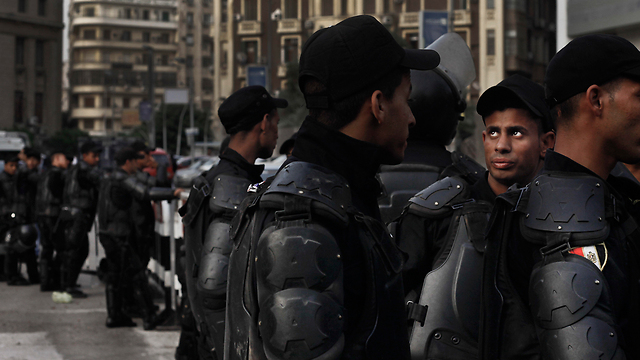
Demonstration in Cairo against Egyptian President Abdel Fattah al-Sisi
צילום: AP
Peace, liberty and Islam
Readers' Say: Ynetnews reader provides an analysis of the difficult choices the West faces citing evidence that domestic peace, civil liberties and Islam are incompatible.
There have been numerous studies on the relationship between Islam and peace in addition to Islam and liberty. Beyond the smoke and mirrors that mainstream media and politicians feed public opinion, there is strong evidence to suggest that a triangle of incompatibility constrains these three forces. In other words, there can be domestic peace and civil liberties without Islam; civil liberties and Islam without domestic peace; or domestic peace and Islam without civil liberties.
This triangle of incompatibility is evident on a global scale. Of the 49 predominantly Muslim countries in the world, only Tunisia and Senegal are classified as free societies by the Freedom House Institute which monitors political and civil liberties throughout the world. This means a whopping 96% of predominantly Muslim states are partially authoritarian or entirely totalitarian.
Among predominantly non-Muslim countries the percentage of free societies is proportionately 14 times greater.
These indicators show that the Islamic world lags behind the non-Muslim world in its political evolution - thus suggesting that democratization ought to be a desirable next step. However the chaos and bloodshed following the ouster of autocrats during the Arab Spring suggests that this democratization was ill-advised. Indeed, domestic peace crumbled when political liberalization encountered Islamic politics.
The sole Middle Eastern countries that have not succumbed to strife nor been riveted by terror attacks following the Arab Spring have been those like Jordan, Algeria, Morocco or the Gulf States where elections are not free and civil liberties are curtailed.
This triangle of incompatibility could be just another paradigm to understand Middle Eastern politics. Unfortunately, this paradigm also highlights the difficult choices that will need to be made by Europe and the United States during the coming decade. For example, Israel secured a modicum of domestic peace and civil liberties after Independence by pushing the bulk of its Islamic population beyond its borders through the so-called Palestinian Nakba.
From 1967 until the Oslo Agreements, which led to the establishment of the Palestinian Authority, Jews in the West Bank enjoyed relative peace, because the political freedoms of the local Islamic population were curtailed. As soon as political rights were granted to this population, a recrudescence of violence cost thousands of Jewish and Arab lives throughout Israel, the West Bank and the Gaza Strip.
China and Putin’s Russia have enjoyed relatively high degrees of domestic peace while hosting huge Islamic populations. This has been achieved by restricting civil liberties via draconian limitations on religious rights and freedoms of expression. The pressing question is: How can the West maintain civil peace now that it hosts burgeoning Islamic communities coaxed by radical preachers and the heavenly rewards Islam promises to its martyrs?
The triangle of incompatibility suggests that Europe and the United States can either espouse the anti-Islam policies promoted by Trump and far right-wing parties in Europe in order to secure long-term domestic peace and civil liberties; adhere to civil liberties and sacrifice domestic peace in order to accommodate Islam; or curtail civil liberties to quash the threat to peace posed by Islamists on one end and nativist reactionaries on the other end.
Right now, the Obama administration and the moderate politicians running European governments have chosen to jeopardize domestic peace by pretending that traditional Western rights and liberties can be reconciled with the presence of growing Islamic communities. The recurrent coordinated and lone-wolf terror attacks in the USA and Europe suggest this course is not sustainable.
Given the vastness and complexity of the problem, it is unlikely that the path the West selects will be clear-cut: Domestic peace, civil liberties and Islam will each be constrained to differing degrees in different countries. Some countries, particularly in Eastern Europe, will prefer to constrain Islam to secure greater spaces for domestic peace and civil liberties; more progressive societies such as those in Western Europe will opt to sacrifice spaces of domestic peace and civil liberty in order to co-exist with Islam.
Indeed, authorities in particularly progressive Sweden and Germany have already resorted to censorship of media articles and social networks to hush voices that link Islamic sub-cultures to rape attacks, crime and terrorism.
Under these circumstances, the best outcome we can hope for is for the non-Muslim world to juggle domestic peace, civil liberties and the religious rights of Muslim minorities more wisely than the Muslim world. This could convince a critical mass of Muslims that respect for domestic peace and civil liberties – not fealty to Islam – are the keys to a brighter future.
The views and opinions expressed in this reader-submitted op-ed are those of the author and do not imply endorsement by, or reflect the views of, Ynetnews.











